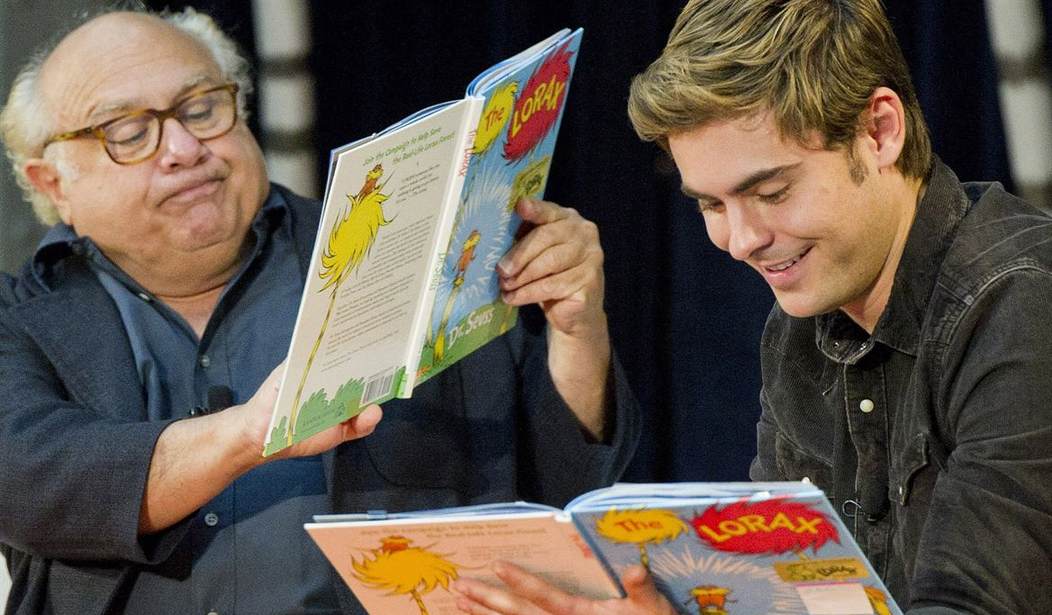In Virginia, they’re trying to get rid of racist writers in the realm of children’s reading.
I’m speaking, of course, of Dr. Seuss.
A national teachers group is schooling public institutions: If you wanna do right, avoid reading Dr. Seuss due to “racial undertones.”
As noted by The Daily Wire, for more than two decades, March 2nd has been celebrated as Read Across America Day. The date honors the beloved author — it’s his birthday.
Such observance was established in 1998 by America’s largest teachers union, the National Education Association.
This year’s theme: “Create and Celebrate Diversity.”
Hence, educators organization Learning for Justice is game to enact some — by #canceling the good Dr.
The edict: Avoid “connecting Read Across America Day with Dr. Seuss.”
And Virginia’s Loudoun County Schools is listening.
The prominent district’s said it’ll no longer salute Seuss.
From an announcement obtained by TDW:
Realizing that many schools continue to celebrate “Read Across America Day” in partial recognition of [Dr. Seuss’s] birthday, it is important for us to be cognizant of research that may challenge our practice in this regard. As we become more culturally responsive and racially conscious, all building leaders should know that in recent years there has been research revealing radical undertones in the books written and the illustrations drawn by Dr. Seuss.
So what’s all the hubbub?
Learning for Justice cites a St. Catherine University study:
This year, Read Across America Day was preceded by the publication of a new study. Researchers Katie Ishizuka and Ramón Stephens examined 50 children’s books and 2,200 characters created over Theodore Seuss Geisel’s nearly 70-year career “to evaluate the claims that his children’s books are anti-racist.” Their findings were shocking.
That’s courtesy of the LFJ article “It’s Time to Talk About Dr. Seuss.”
The author gets it:
I get it. You grew up on Dr. Seuss. I did too! It’s probably safe to assume that most people did and will continue to do so for the foreseeable future. But we have to recognize that two things can be true at the same time:
Dr. Seuss is a prolific children’s book author and global icon. And Dr. Seuss has a history of racial baggage that educators should understand when introducing his writing to their students.
If you’re thinking you need to burn your favorite copy of The Sneetches or The Cat in the Hat Comes Back, I’d really rather that you didn’t—we’re all about environmental safety here. If you’re thinking you need to have some important conversations with your students? You’re absolutely right.
And if you’re wondering if the race of researchers matters, it definitely does:
How do we talk about this with students?
One way to start could be sharing the conversation scholars themselves are having. For context: Geisel biographers and historians are (you might want to sit down for this one) virtually 100 percent white. The researchers behind the new study are people of color, and more specifically they’re from groups that were often on the receiving end of racial attacks in Geisel’s early work and in some of his children’s books.
So what’d the study turn up?
It’s actually pretty bad. The researchers behind this study set out to address “a gap in Seuss literature by revealing how racism spans across the entire Seuss collection.” Responding to the idea that Geisel was simply a product of his time, they disagree. “[N]ot all White people ‘of his time’ engaged in overt racism or used their platforms to disseminate racist narratives and images nationally and globally, as he did,” they argue. “There are White people throughout history, and of his generation, who actively resisted racism and risked their lives and careers to stand up against it.”
This isn’t the first time Seuss’s sinisterness has been sussed out.
In December, I covered the gripes of group Disrupt Texts:
Disrupt Texts is a crowdsourced, grass roots effort by teachers for teachers to challenge the traditional canon in order to create a more inclusive, representative, and equitable language arts curriculum that our students deserve. It is part of our mission to aid and develop teachers committed to anti-racist/anti-bias teaching pedagogy and practices.
Other works to woke out:
To Kill a Mockingbird and The (slut-shaming) Scarlet Letter, along with harm from Homer and William Shakespeare.
I don’t mind saying it: I’d rather die than teach Scarlet Letter. Unless you are teaching about how to fight against misogyny and slut-slaming. Easy A is a good movie though. Plus, Hawthorne wrote dope short stories. Black Veil, Birthmark?! Do better. #disruptexts #ProjectLITchat
— Evin Shinn (@baritoneblogger) June 23, 2018
Back to the St. Catherine’s study, of 50 Seuss books, here’s what the research revealed:
“Of the 2,240 (identified) human characters, there are forty-five characters of color representing 2% of the total number of human characters.” Of the 45 characters, 43 exhibited behaviors and appearances that align with harmful and stereotypical Orientalist tropes. The remaining two human characters “are identified in the text as ‘African’ and both align with the theme of anti-Blackness.” It’s also important to note that each of the non-white characters is male and that they are all “presented in subservient, exotified, or dehumanized roles,” especially in their relation to white characters.
It’s fascinating what a full inspection can find.
So next time you think of reading The Cat and the Hoo Hat, think better.
For further information, check out www.learningforjustice.org.
Or you may know them by their former name — “Teaching Tolerance.”
-ALEX
See more pieces from me:
Countdown: An Expert Predicts the West’s Sperm Count Will Soon Be Zero
Glitz and Glamour: Julia Roberts Will Present Anthony Fauci With the Award of Courage
Find all my RedState work here.
Thank you for reading! Please sound off in the Comments section below.














Join the conversation as a VIP Member